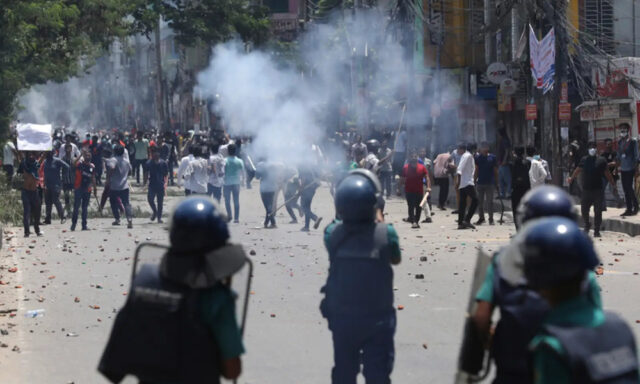GENEVA: Bangladesh’s previous government and security forces committed severe human rights abuses during last year’s student-led protests, a UN report says.
The UN report highlights systematic repression by Awami League-linked groups and state authorities against anti-government demonstrators and sympathizers.
Testimonies and evidence suggest an official policy of violence aimed at crushing opposition, raising concerns about crimes against humanity.
Between 1 July and 15 August, as many as 1,400 people were killed, most shot by security forces.
The report estimates that 12-13 percent of those killed were children, while 44 police officers also died.
Protest Triggers
The demonstrations began after the High Court reinstated a public job quota system, sparking wider outrage over governance issues.
Public frustration was fueled by political corruption, growing inequalities, and systemic failures in governance.
To maintain control, the former government used increasingly violent tactics to suppress nationwide protests.
UN Human Rights Chief Volker Turk described the crackdown as a calculated strategy to retain power amid mass opposition.
He cited extrajudicial killings, arbitrary arrests, and torture as deliberate tactics by political leaders and security officials.
State Violence
The report describes targeted killings, unlawful detentions, and brutal torture, possibly constituting international crimes.
The UN urges accountability, emphasizing justice as crucial for Bangladesh’s stability and national healing.
At Interim Government Chief Advisor Mohammed Yunus’s request, the UN sent an independent investigative team to Bangladesh.
The team included human rights experts, a forensic doctor, and a weapons specialist to assess events impartially.
The Interim Government cooperated fully, providing unrestricted access and substantial documentation.
Direct Orders
Former officials revealed how top leaders ordered and oversaw violent crackdowns on protesters.
Security forces intentionally killed or maimed demonstrators, sometimes shooting them at close range.
Women Targeted
Women protesters, including leaders, faced arbitrary arrests, torture, and physical assaults.
Awami League supporters and security forces used gender-based violence to intimidate female demonstrators.
Reports document threats of rape and other abuses aimed at discouraging women from protesting.
Children were also victims, suffering arbitrary detention, torture, and inhumane treatment.
Some children were shot, arrested, or died from wounds caused by security forces.
Deadly Incidents
A 12-year-old boy in Dhanmondi died from internal bleeding after being hit by 200 metal pellets.
Young children at protests, including bystanders, were killed in shootings by security forces.
A six-year-old girl in Narayanganj was fatally shot in the head while watching from her rooftop.
On 5 August, a deadly day, a 12-year-old survivor described police gunfire “falling like rain.”
He recalled seeing at least a dozen dead bodies after the police fired indiscriminately.
Medical Obstruction
Security forces denied injured protesters medical treatment and interrogated patients in hospitals.
Authorities seized hospital CCTV footage and collected fingerprints to track down demonstrators.
Medical staff were intimidated as officials sought to suppress evidence of state violence.
Hospitals became sites of fear, with injured protesters facing further persecution.
UN investigators documented multiple cases of obstructed medical care and harassment.
Retaliation Attacks
As the former government lost control, revenge killings and violent reprisals increased.
Awami League members, police, and journalists faced deadly attacks from anti-government groups.
Religious minorities, including Hindus and Ahmadiyya Muslims, were also targeted.
Indigenous communities in the Chittagong Hill Tracts suffered human rights abuses.
Though 100 arrests were made, many perpetrators still act with impunity.
Future Reforms
The UN recommends major reforms in security, justice, and political systems.
Laws restricting civic and political freedoms should be abolished to prevent future abuses.
Authorities must address past human rights violations through truth-seeking and accountability.
Justice is essential to prevent such violent crackdowns from recurring.
The UN pledges support for Bangladesh’s reform and accountability efforts.











